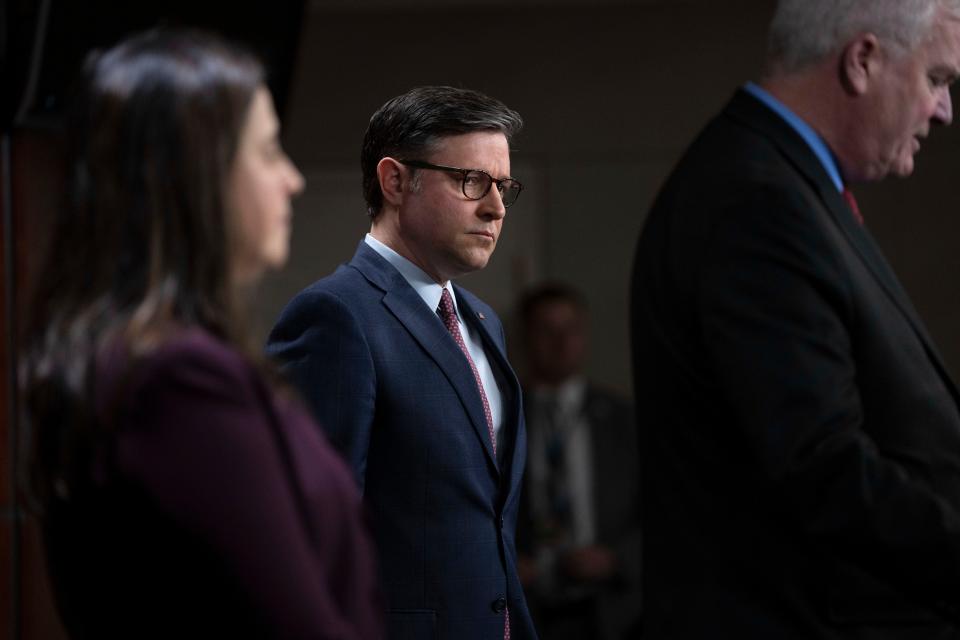New Congressional task force could regulate use of AI but not focused on 2024 election
With the 2024 election cycle in full swing, a bipartisan House task force was announced Saturday that could tackle the emerging challenges of artificial intelligence and its potentially destructive impact on a wide range of issues. But its focus won't be on the 2024 election.
House Speaker Mike Johnson of Louisiana and House Minority Leader Hakeem Jeffries of New York joined forces to form the task force. Its aim will be to regulate and legislate the use of artificial intelligence.
“To win the future for America’s economy and workers, Congress must develop solutions ready for the rapid technological shift already underway with the emergence of artificial intelligence. This bipartisan, committee-driven taskforce under the leadership of Speaker Johnson and Leader Jeffries will build consensus toward taking the first steps," Raj Shah, Speaker Mike Johnson's deputy chief of staff for communications, said in an email Saturday.

The task force, however, will not focus primarily on the 2024 election, he said in a follow-up text message and emphasized the need for it to be wide-ranging to cover all areas affected by AI. Shah did not immediately respond when asked if the task force will be empowered to make suggestions or recommendations that could affect the use of AI in the 2024 election. Leader Jeffries' office did not respond to a request for comment.
One lawmaker noted it is imperative that legislation to regulate AI-generated content in elections is passed before Congress goes into August recess, to get ahead of AI-generated misinformation and deepfakes amid a politically fraught and polarizing election year.
“Best case is we get out ahead of it. We’d be able to tell the candidates ‘You can’t do this, and if you do there will be consequences,’” Rep. Don Beyer, D-Va., said in an interview with USA Today on Friday. “Worst case is we don’t do anything and there’s a proliferation of AI-generated fake messages and people make decisions they wouldn’t otherwise make based on bad information.”
Beyer recently returned to college to pursue a master’s degree in AI and machine learning at George Mason University. The senior House Democrat on the Joint Economic Committee and member of the House Ways and Means Committee has since become a leading proponent of policy to regulate the new technology.
“We don’t know exactly what’s going to happen, but the early signs are worrying — the use of Joe Biden’s voice, AI-generated, in New Hampshire was upsetting. I’m sure President Trump wasn’t excited when DeSantis used AI to generate a picture of Donald Trump and Anthony Fauci together,” Beyer said.
Two bills that would regulate the use of AI-generated content in political campaigns were introduced in Congress in 2023 but have languished. One, introduced by Rep. Yvette Clarke, D – New York, in May, would expand disclosure requirements for campaign ads to include if AI was used to generate videos or images. The other, introduced in September and led by Sen. Amy Klobuchar, D – Minn., would forbid the use of AI in political advertising.
While congressional action on how to tame AI-generated content significantly lags, the White House Artificial Intelligence Council met on Jan. 29, three months after President Joe Biden signed an executive order to reduce the risks of AI involving national security and consumer rights.
Before signing the order in October 2023, Biden said that artificial intelligence is driving change at "warp speed" and carries tremendous potential and pitfalls.
"AI is all around us, Biden said. "To realize the promise of AI and avoid the risk, we need to govern this technology."
The House task force will be composed of members from both sides of the aisle, 12 Democrats and 12 Republicans, with special expertise in the new technology, and will include some who sit on committees of jurisdiction such as Energy and Commerce; Science, Space and Technology; Oversight and Accountability; Armed Services and Judiciary.
This article originally appeared on Staunton News Leader: Bipartisan congressional group aims to regulate AI